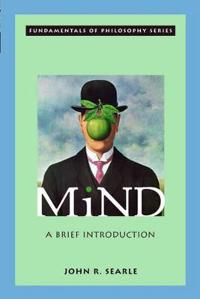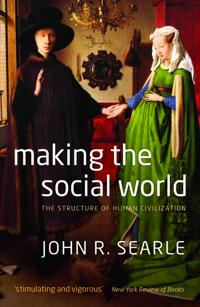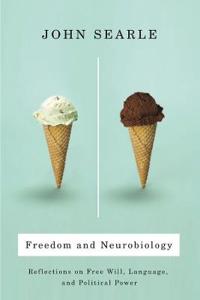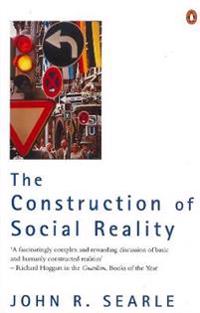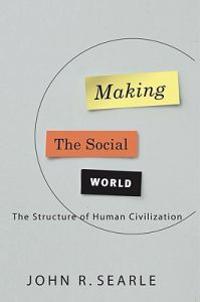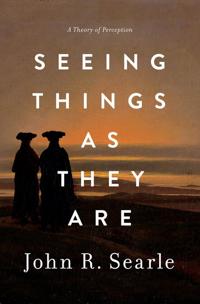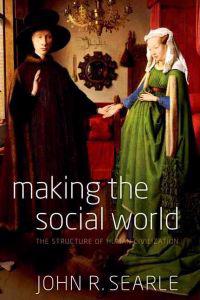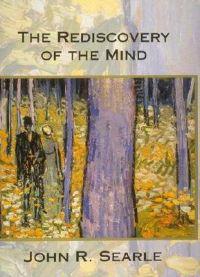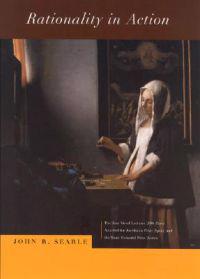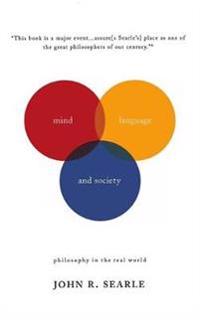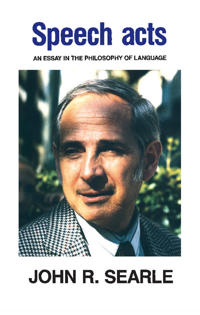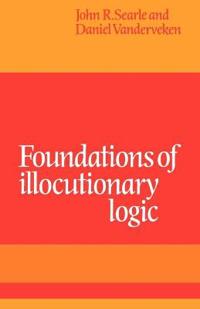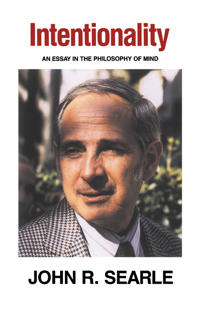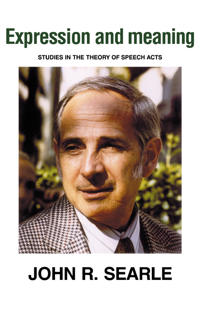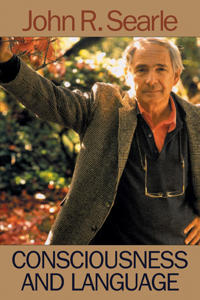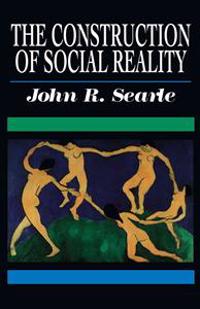Mind (Häftad)
avJohn Searle
ISBN: 9780195157345 - UTGIVEN: 200509"The philosophy of mind is unique among contemporary philosophical subjects," writes John Searle, "in that all of the most famous and influential theories are false." One of the world's most eminent thinkers, Searle dismantles these theories as he presents a vividly written, comprehensive introducti[...]
Making the Social World (Inbunden)
avJohn Searle
ISBN: 9780199576913 - UTGIVEN: 2010-01The renowned philosopher John Searle reveals the fundamental nature of social reality. What kinds of things are money, property, governments, nations, marriages, cocktail parties, and football games? Searle explains the key role played by language in the creation, constitution, and maintenance of so[...]
Making the Social World (Häftad)
avJohn Searle
ISBN: 9780199695263 - UTGIVEN: 201108The renowned philosopher John Searle reveals the fundamental nature of social reality. What kinds of things are money, property, governments, nations, marriages, cocktail parties, and football games? Searle explains the key role played by language in the creation, constitution, and maintenance of so[...]
Freedom and Neurobiology: Reflections on Free Will, Language, and Political Power (Inbunden)
avJohn Searle
ISBN: 9780231137522 - UTGIVEN: 2006-10-11Freedom and Neurobiology (Häftad)
avJohn Searle
ISBN: 9780231137539 - UTGIVEN: 200808Our self-conception derives mostly from our own experience. We believe ourselves to be conscious, rational, social, ethical, language-using, political agents who possess free will. Yet we know we exist in a universe that consists of mindless, meaningless, unfree, nonrational, brute physical particle[...]
John Searle
ISBN: 9780826497529 - UTGIVEN: 2009-11This book offers a concise and accessible introduction to his work and thought, ideal for students coming to his philosophy for the first time. John Searle is one of the most important and influential analytic philosophers working today. He has made significant contributions to the fields of the phi[...]
John Searle's Ideas About Social Reality: Extensions, Criticisms, and Recon (Inbunden)
avEditor:David Koepsell, Editor:Laurence S. Moss
ISBN: 9781405112574 - UTGIVEN: 2003-05-31John Searle's Ideas About Social Reality: Extensions, Criticisms, and Recon (Häftad)
avEditor:David Koepsell, Editor:Laurence S. Moss
ISBN: 9781405112581 - UTGIVEN: 2003-05-31John Searle (Häftad)
avNicholas Fotion
ISBN: 9781902683096 - UTGIVEN: 2000-11Direct, combative and wide-ranging, John Searle's philosophy has made fundamental and lasting contributions to thinking in language, mind, knowledge, truth and the nature of social reality. His account of language based on speech-acts, that mind is intentional, and the Chinese Room Argument, are jus[...]
The Construction of Social Reality (Storpocket)
avJohn R. Searle
ISBN: 9780140235906 - UTGIVEN: 199609This short treatise looks at how we construct a social reality from our sense impressions; at how, for example, we construct a 'five-pound note' with all that implies in terms of value and social meaning, from the printed piece of paper we see and touch.[...]
Making the Social World: The Structure of Human Civilization (Inbunden)
avJohn R. Searle
ISBN: 9780195396171 - UTGIVEN: 2010-01Seeing Things As They Are (Inbunden)
avJohn R. Searle
ISBN: 9780199385157 - UTGIVEN: 2015-01This book provides a comprehensive account of the intentionality of perceptual experience. With special emphasis on vision Searle explains how the raw phenomenology of perception sets the content and the conditions of satisfaction of experience. The central question concerns the relation between the[...]
Making the Social World: The Structure of Human Civilization (Häftad)
avJohn R. Searle
ISBN: 9780199829521 - UTGIVEN: 201108There are few more important philosophers at work today than John Searle, a creative and contentious thinker who has shaped the way we think about mind and language. Now he offers a profound understanding of how we create a social reality--a reality of money, property, governments, marriages, stock [...]
The Rediscovery of the Mind (Häftad)
avJohn R. Searle
ISBN: 9780262691543 - UTGIVEN: 199208In this major new work, John Searle launches a formidable attack on current orthodoxies in the philosophy of mind. More than anything else, he argues, it is the neglect of consciousness that results in so much barrenness and sterility in psychology, the philosophy of mind, and cognitive science: the[...]
Rationality in Action (Häftad)
avJohn R. Searle
ISBN: 9780262692823 - UTGIVEN: 200302The study of rationality and practical reason, or rationality in action, has been central to Western intellectual culture. In this invigorating book, John Searle lays out six claims of what he calls the Classical Model of rationality and shows why they are false. He then presents an alternative theo[...]
Mind, Language and Society (Häftad)
avJohn R. Searle
ISBN: 9780465045211 - UTGIVEN: 199911Disillusionment with psychology is leading more and more people to formal philosophy for clues about how to think about life. But most of us who try to grapple with concepts such as reality, truth, common sense, consciousness, and society lack the rigorous training to discuss them with any confiden[...]
Generalized, Linear, and Mixed Models, 2nd Edition (Inbunden)
avCharles E. McCulloch, Shayle R. Searle, John M. Neuhaus
ISBN: 9780470073711 - UTGIVEN: 2008-06-30Speech Acts (Häftad)
avJohn R. Searle
ISBN: 9780521096263 - UTGIVEN: 196901Written in an outstandingly clear and lively style, this 1969 book provokes its readers to rethink issues they may have regarded as long since settled.[...]
Foundations of Illocutionary Logic (Häftad)
avJohn R. Searle, Daniel Vanderveken
ISBN: 9780521108850 - UTGIVEN: 200902This is a formal and systematic study of the logical foundations of speech act theory. The study of speech acts has been a flourishing branch of the philosophy of language and linguistics over the last two decades, and John Searle has of course himself made some of the most notable contributions to [...]
Intentionality (Häftad)
avJohn R. Searle
ISBN: 9780521273022 - UTGIVEN: 198305John Searleâs Speech Acts (1969) and Expression and Meaning (1979) developed a highly original and influential approach to the study of language. But behind both works lay the assumption that the philosophy of language is in the end a branch of the philosophy of the mind: speech acts are forms [...]
Expression and Meaning (Häftad)
avJohn R. Searle
ISBN: 9780521313933 - UTGIVEN: 198511John Searleâs Speech Acts made a highly original contribution to work in the philosophy of language. Expression and Meaning is a direct successor, concerned to develop and refine the account presented in Searleâs earlier work, and to extend its application to other modes of discourse such [...]
Consciousness and Language (Häftad)
avJohn R. Searle
ISBN: 9780521597449 - UTGIVEN: 2002-07One of the most important and influential philosophers of the last 30 years, John Searle has been concerned throughout his career with a single overarching question: how can we have a unified and theoretically satisfactory account of ourselves and of our relations to other people and to the natural [...]
Minds, Brains and Science (Häftad)
avJohn R. Searle
ISBN: 9780674576339 - UTGIVEN: 1986-01"Minds, Brains and Science" takes up just the problems that perplex people, and it does what good philosophy always does: it dispels the illusion caused by the specious collision of truths. How do we reconcile common sense and science? Searle argues vigorously that the truths of common sense and the[...]
The Construction of Social Reality (Pocket)
avJohn R. Searle
ISBN: 9780684831794 - UTGIVEN: 199701In The Construction of Social Reality, John Searle argues that there are two kinds of facts--some that are independent of human observers, and some that require human agreement.[...]

